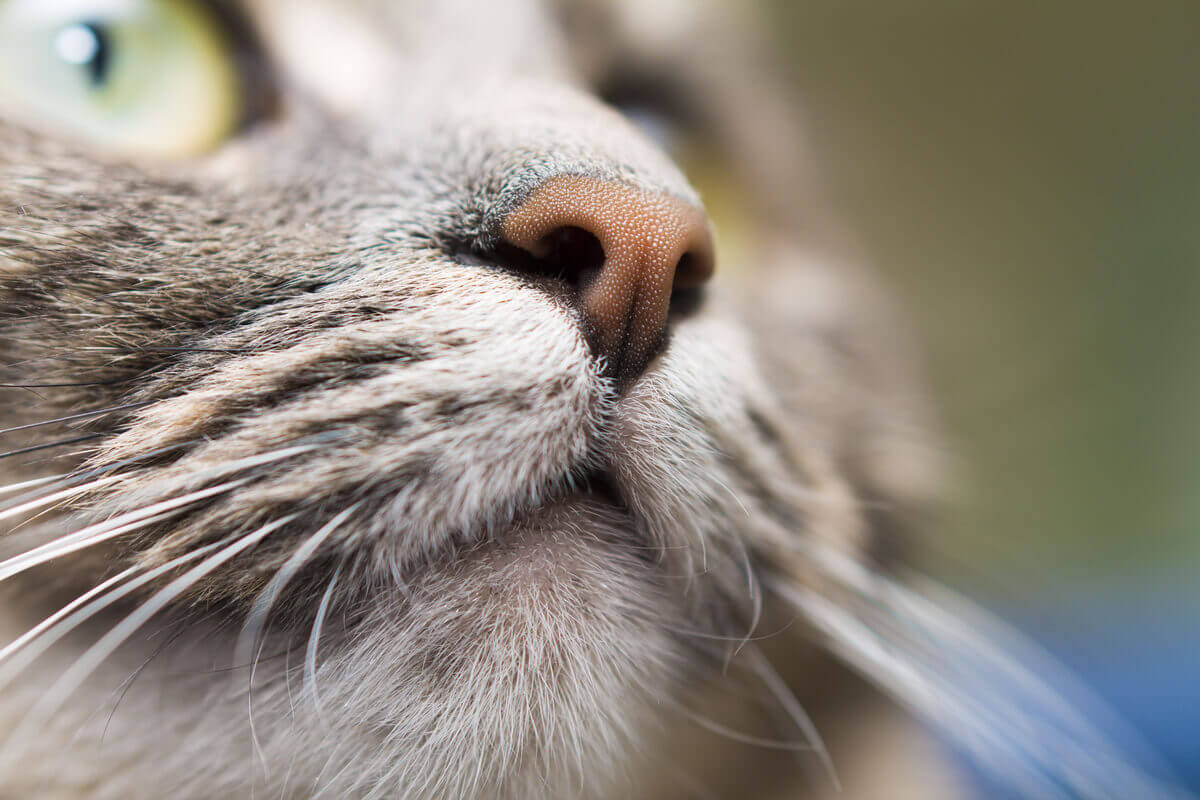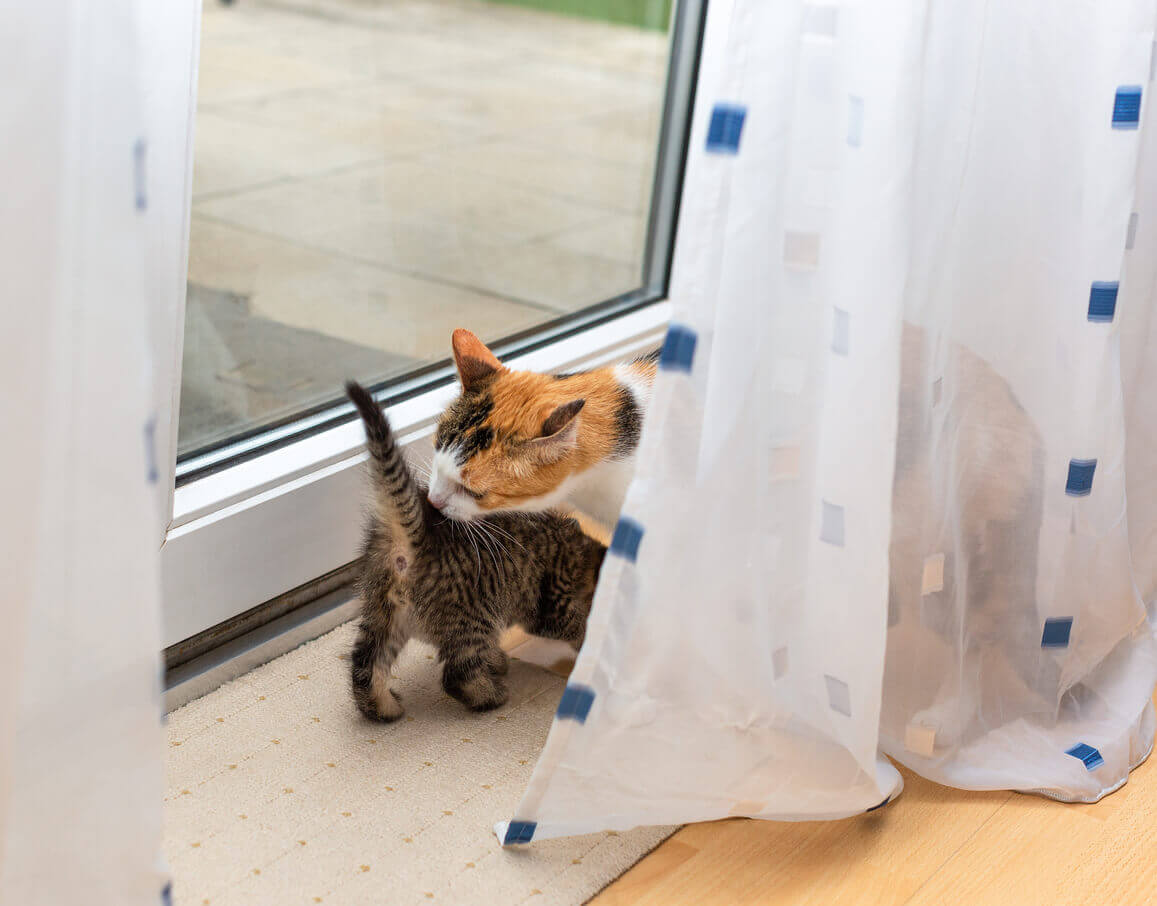Why Do Cats Sniff Their Anus?


Reviewed and approved by the biologist Samuel Sanchez
Have you ever seen cats sniff their anus or even another cat’s? Why do you think this happens? To answer this question, it’s important to know about a cat’s sense of smell, and its way of communicating through this sense.
Cats sniff their anus for many reasons, ranging from the most natural to certain diseases. If you want to know how the sense of smell of felines is related to their anus and what purpose smelling it has, be sure to keep reading.
The sense of smell in cats
According to experts from VCA Hospitals, and like humans, cats have 5 basic neurological senses: taste, touch, hearing, sight, and smell. Of these senses, smell is the most developed in the feline world.
Compared to humans, cats have a sense of smell that’s 14 times more sensitive. The human nose contains about 5 million olfactory receptors that detect aromas, while a cat’s nose carries between 45 and 80 million olfactory receptors.

Jacobson’s Organ
In addition to this overdeveloped sense of smell, cats also have an additional tool to enhance this power even further: Jacobson’s organ (a special structure also known as the vomeronasal organ). This is located inside the nasal cavity and opens towards the top of the mouth, just behind the upper incisors.
This amazing organ serves as a secondary olfactory system and detects specific chemicals through the use of nerves that lead directly to the brain. Unlike the olfactory cells in the nose, the odor receptors of Jacobson’s organ don’t respond only to ordinary odors, but also pick up chemicals that have no scent at all.
These receptors function in order to recognize odors that are undetectable by humans.
Other functions of Jacobson’s organ
Jacobson’s organ communicates with the part of the brain that deals with mating and its main function is related to reproduction. By identifying pheromones, these nerve endings provide male and female cats with the information needed to determine if a member of the opposite sex is available.
In addition, this organ enhances the sense of smell that newborn kittens need to find the food source provided by their mother. The little felines are able to identify their mother from other nursing mothers through their sense of smell.
Why do cats sniff their anus with their mouths open?
The two parts of the feline odor detection system (the nose and Jacobson’s organ) work together to register delicate smells that no other structure would pick up on its own. When a kitty purses its lips and appears to smile, it’s because it has opened its Jacobson’s organ and the air is pushing odors toward it.
If you’ve seen your cat sniff its own anus with its mouth open, it’s because it’s sensing something that catches its olfactory attention.
However, if cats sniff their anus very often, it’s usually a cause for concern. It’s normal for them to interact with this area for grooming purposes, but if your feline does it very constantly, you should find out from your vet what’s going on, as there may be a problem with their anal glands.
What are the anal glands in cats?
Both male and female cats have two anal glands located around their rectal openings. According to experts, from the outside, they look like two very small holes on either side of the anus.
These visible openings lead to the small balloon-shaped anal glands found inside the feline’s rectal organism. The glands are naturally filled with a foul-smelling fluid that is expelled when a feline defecates. Anal glands are very important, as they allow cats to mark their territory and communicate their presence to other animals.
A feline also tends to expel fluid from its anal glands if it’s frightened or stressed. This is often seen when a kitty needs to visit the vet or groomer and the fluid can splash out and result in a very bad smell. So, if your cat smells its anus a lot, licks it, or rubs it on the floor frequently, it’s important to look into what’s causing the behavior.
Why do cats sniff each other’s anuses?
Felines also communicate with each other, but they do it in different ways depending on the immediate context. They don’t shake hands or hug and they don’t communicate verbally, but they do examine each other in a seemingly imperceptible way.
When two felines meet, they usually sniff the head area first and even give each other a gentle tap in this area. The physical greeting releases pheromones, which tell each one a lot about the mood and physiological state of the other.
Therefore, a feline’s sense of smell serves as a chemical communication tool. The aromas produced provide information to a cat about what its new friend likes to eat and what mood they’re in.
Just by smelling a companion, a cat is able to determine whether it’s male or female, calm or aggressive, healthy or sick. As you know, inside the rectum we find anal glands, and when cats sniff another cat’s anus, they can glean a great deal of information.
The scent is unique to each cat and serves as a form of identification, so two felines are often quick to determine if they’ve met before by smell.
On the other hand, the very act of butt-sniffing establishes dominance in the relationship. The dominant cat will generally initiate the sniffing, while the more submissive cat will wait its turn.

As you can see, there’s always something behind animal behavior. In this case, cats have several reasons to sniff their anuses, and some are as natural and necessary in their feline life as the simple acts of climbing and meowing. Just the same, if your pet practices this act in excess, it’s a good idea to go to the vet.
All cited sources were thoroughly reviewed by our team to ensure their quality, reliability, currency, and validity. The bibliography of this article was considered reliable and of academic or scientific accuracy.
- The Spruce Pets. (2020, 22 mayo). What Are Anal Glands in Cats? Recuperado 25 de octubre de 2021, de https://www.thesprucepets.com/anal-gland-expression-in-cats-552152
- VCA. (s. f.). Why Cats Sniff Rear Ends. VCA Corporate. Recuperado 25 de octubre de 2021, de https://vcahospitals.com/know-your-pet/why-cats-sniff-butts
This text is provided for informational purposes only and does not replace consultation with a professional. If in doubt, consult your specialist.